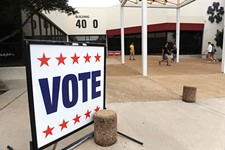Beside the Point
It's Beginning to Look a Lot Like 2007
By Wells Dunbar, Fri., Dec. 22, 2006
Señorita Claus be damned, Responsible Growth for Northcross didn't go quietly into that silent night. Instead, the noon protest culminated in a hearing that evening, over Wal-Mart and Lincoln Property Group's plans to build at Northcross Mall (and the related, if belated, Big Box Ordinance). A lengthy executive session (one guess what they were discussing) got the hearing off to a late start. Assistant City Manager Laura Huffman led the council and a sizable, incredulous audience through the approval process. Huffman reiterated the now-familiar storyline – that, by applying to build at the mall under its existing, decades-old, and extraordinarily permissive zoning categories, Lincoln's site-plan application skirted the more extensive public notice a newly sited Wal-Mart – or virtually any store – would require.
When the topic turned to council's legal recourses – heretofore a rapidly shifting, shrinking, and transforming thing, depending on which day you caught city staff – well, the neighbors caught them on a bad day. "The application was complete," said Huffman, "but we did find a mistake that we made, and the mistake that we made had to do with notice." But according to Huffman, the lack of sufficient "interested parties" notice, which allows neighbors greater oversight, and which inexplicably evaporated years ago, is the city's problem, "Not something that falls onto the responsibility of the developer."
She then turned to the newest revelation. Beyond the announcement that Lincoln and Wal-Mart would institute a 60-day moratorium on demolition – news that did little to impress RG4N – came word of Lincoln's filing of a new, separate site plan for Northcross. Huffman hastened to add that a company can't have two approved plans – rather, one approved plan and a "second, filed application in the system." This bureaucratic paper shuffling, presumably with everyone from here to Ardmore getting noticed, also allows time for Wal-Mart to pursue its public-relations charm offensive, bearing green-building-this and design-standards-that.
The bloodletting didn't begin in earnest until the question became: traffic. Despite city counts of some 28,000 actual car trips at the smaller Wal-Mart on Slaughter Lane and 150 to 300 18-wheeler trips projected daily to stock the Northcross Supercenter, an impact analysis said – to a chorus of jeers – that Burnet and Anderson would still operate at "an acceptable level of service, D or better" (E presumably standing for "Everyone and Their Mothers on the Road"). Lincoln's own traffic estimates are even rosier, prompting Brewster McCracken to say "if Wal-Mart and Lincoln folks are watching tonight, I would call on them to tell the truth when they submit their next traffic impact analyses." (Speaking of truthiness, the city auditor's office said it found no evidence city staff worked to delay the Big Box Ordinance, adding that the scope of the auditor's review was constrained by time limits.)
The most surprising admission of the evening came from City Attorney David Smith, whose legal department is legendary for its trepidation before major property owners. Under McCracken's quizzing, Smith acknowledged that the city possesses regulatory "police powers" to curtail Wal-Mart's 24-hour operation. This information was designated for further discussion, as council urged negotiation between neighbors and developers on every conceivable subject: traffic, parking, design standards, environmental impact, lighting, and noise.
Wal-Mart's long track record doesn't exactly inspire confidence; nor do early reports from the neighbors. On Monday, the Crestview Neighborhood Association was treated to a bait-and-switch, expecting a meet-up with Lincoln or Wal-Mart, and provided instead with Wal-Mart's engineering and public-relations subcontractors. Still, negotiation may well be the neighbors' best recourse. The city insists it can't act on its own failure-to-notice, and any "police powers" restriction would have to be applied equitably (across the city), raising a whole host of ex post facto complications. But the city attorney's unexpected suggestion of actual civic influence – the power to exercise at least a little say and to recognize, as one council member put it, the neighbors' "right to self-determination," to say nothing of the city's – should give Wal-Mart opponents at least a ray of hope.
Council returns in the new year, Jan. 11.
Got something to say on the subject? Send a letter to the editor.








